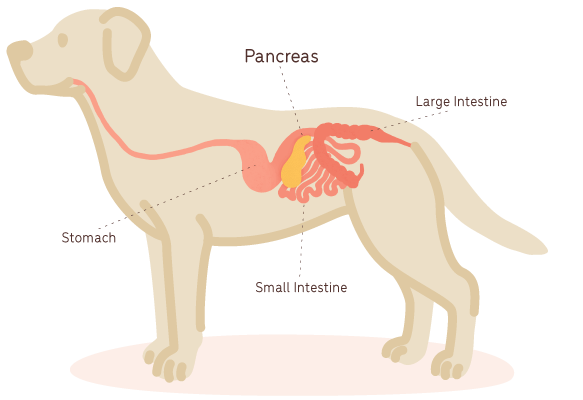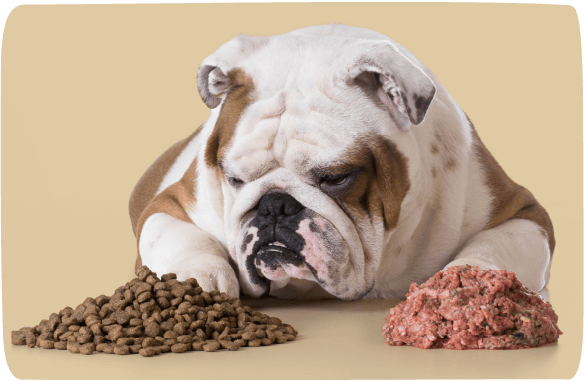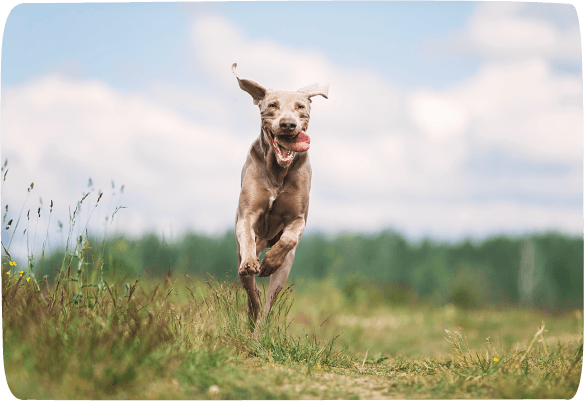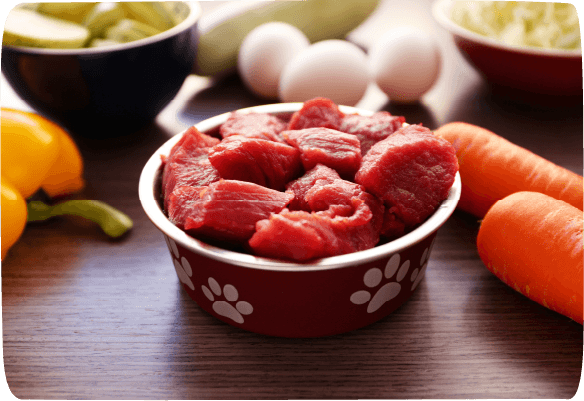Pancreatitis in dogs – Holistic Prevention and Treatment

By Dr Edward Bassingthwaighte, Holistic Veterinarian

Let's start with defining what pancreatitis is. Pancreatitis is an inflammation of the pancreas. The pancreas is the organ that is responsible for the excretion of digestive enzymes and insulin, which control blood glucose levels. It’s intensely painful and causes symptoms of inappetence, abdominal pain, depression, vomiting, dehydration, weakness, lethargy, fever, and diarrhoea.
Symptoms can range from mild to catastrophically severe. Severe cases may require hospitalisation, intensive care, and may cause death. Early signs may be mild and non-specific, so it can be hard to tell what’s actually going on in some cases.
Pancreatitis in pets is not well understood. We do know that the symptoms are caused by an early activation of digestive enzymes, then the tissues of the pancreas are literally digested. Pancreatitis can develop suddenly in a previously healthy pet, for no apparent reason, though there is usually a cause that can be found. Some pancreatitis cases seem to have no triggers and no pattern of causation that we can understand at all. Pancreatitis is common in dogs, but very rare in cats.
Pancreatitis causes damage to the pancreas, and can cause pancreatic exocrine insufficiency (lack of digestive enzymes) or diabetes mellitus over time (or rapidly with severe pancreatitis). In rare cases, there may be scarring and adhesions secondary to a severe attack.
Pancreatitis may be acute, or chronic - either can be mild or severe when it comes to how ill it makes your pet. Diagnosis of pancreatitis is through blood work. We will find elevated levels of certain enzymes in the blood that tell us the pancreas is inflamed.
However, it’s worth noting that animals on a fresh, raw whole foods diet may have elevated levels of these enzymes without having any pancreatitis. These are naturally higher levels required to digest this kind of diet - and all the ‘normal’ levels are calculated and measured using pets who are on processed diets. This is not a normal, healthy population.

The causes (according to allopathic medicine) of pancreatitis are varied and include:
- Fatty foods: Even a tiny amount of fat can trigger severe pancreatitis in some dogs. Most dogs can tolerate fat, but an excessive amount can trigger pancreatitis even in dogs who generally tolerate fatty foods well.
- A history of being a garbage guts: Dogs who get into awful things and eat them are more likely to develop pancreatitis over time.
- Hypothyroidism and some other endocrine diseases: may be a risk factor for pancreatitis in dogs.
- Obesity: Overweight pets are at significantly increased risk of pancreatitis.
- Severe physical trauma or injury of the abdomen: This may trigger pancreatitis.
- Diabetes Mellitus: Any animal with diabetes is at increased risk of pancreatitis.
- Medications and toxins: Compounds such as cholinesterase inhibitors, calcium, potassium bromide, phenobarbital, l-asparaginase, estrogen, salicylates, azathioprine, thiazide diuretics, and vinca alkaloids may cause pancreatitis.
- Genetic predilection: Certain breeds have a higher risk- including miniature Schnauzers
- Kibble/dry food/processed foods: Pets on a processed diet have an increased incidence of pancreatitis. I believe, this is due to the high levels of carbohydrates and grains, which the carnivores' digestive system is not optimised to digest.
- Mineral and nutrient deficiencies: may contribute to the causation of pancreatitis.
I believe that another possible cause of pancreatitis is an auto-immune issue. I believe this is why the disease can be so unpredictable in onset, in severity, and so inconsistent in the timing of attacks, often without any clear trigger. I’ll talk a little more about this in a minute.

Let’s talk holistic prevention of pancreatitis for pets
The essence of prevention is to do everything you can to:
- Support peak vitality and wellbeing,
- Avoid processed foods, toxins and potentially harmful triggers (like vaccination).
Basically, you need to:
- Give your pets the healthiest, most vital diet possible - a fresh, raw, whole foods diet (like a BARF (biologically appropriate raw food) diet which is what I feed my pets). Home-cooked with fresh ingredients is ok too, I strongly recommend that you avoid processed foods.
- Keep overly fatty foods away from your pets. Even a little bit of a yummy sausage is a big no-no. Make sure you use relatively lean protein and be aware that a lot of cheap pet mince may be very high in fat.
- Make sure your dogs can’t get into rotten things, scraps, etc. A big gut full of anything like this may trigger severe pancreatitis.
- Make sure your pets are not overweight. Any degree of obesity is an important risk factor in pancreatitis.
- Give your pets appropriate exercise. The healthier and fitter your dogs are, the less risk of pancreatitis.
- Avoid toxins and poisons. Commonly used tick, flea, and worming products can add an incredible toxic load to your pet’s body and, in rare cases, may trigger pancreas issues.
- Minimize vaccinations. Vaccinations are the most common trigger to pets developing autoimmune issues. Always titer test before any re-vaccination.
- Reduce stress and anxiety. Any level of stress and anxiety reduces vitality, and can be a contributing cause to all illnesses, including pancreatitis.

Let’s talk holistic treatment of pancreatitis for pets
As soon as any symptoms develop, fast your pets. No food at all for at least 24, preferably 48 hours. As soon as you give food, it triggers the pancreas to make more digestive enzymes, which are what is causing the harm inside the pancreas. If symptoms are mild and not worsening, this may be sufficient to turn things around.
If you have a pet who is vomiting, has diarrhoea, is in pain, or is flat and depressed, you will need veterinary attention. Your vet will want to take blood, and depending on how severe the problem is, your pet may need to stay in the hospital to have intravenous fluids, pain relief, and perhaps other medications including anti-inflammatories and anti-emetics. Generally, antibiotics will not be required.
After your pet comes out of the hospital, or if they are well enough to stay home, there are some things you can do to help with recovery. Homeopathic Arnica or Aconite at 6c or 10c can be given often until you see improvement. Higher potencies should be prescribed by an animal homeopath or vet, and CBD can also be a great supportive medicine.
Acupuncture, herbal medicine, energy healing, and craniosacral therapies can all be of value. When it’s time to reintroduce food, small amounts of bone broth are the best thing to give your pet. Probiotics can help with recovery too.
Then you’ll need to manage diet (low fat), avoid triggers and stresses, and be very alert to early signs of any subsequent bouts, so you can act quickly and hopefully nip it in the bud.
About the Author - Dr Edward Bassingthwaighte.

Dr Edward Bassingthwaighte is a holistic veterinarian, and a world-leading expert in silent pain in pets. Dr Edward is passionate about fresh raw whole foods for dogs. He is the founder of the Whole Energy Body Balance method- a profoundly healing bodywork modality for pet parents and pet wellness professionals to relieve silent pain, anxiety and trauma in pets. Join Dr Edward's free masterclass on silent pain in pets here.
Check out our low-fat recipes for dogs.
